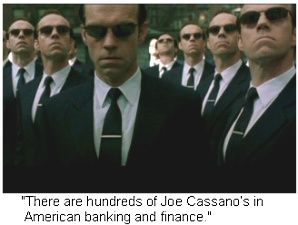AIG's Joe Cassano - An American Tragedy
By Numerian

What’s a capitalist to do when he loses $500 billion and almost single-handedly destroys the global economy? In Japan you would bow deeply in public and express the deepest possible remorse and shame, that is if you already had not committed seppuku. In America, where the Ayn Rand ethos of objectivism reigns supreme, you weasel your way out of any explanation or regret, while riding off in the sunset with your undeserved fortune.
Joe Cassano, former CEO of AIG Financial Products, could have chosen the Ronald Reagan Alzheimers defense: “I have forgotten everything that happened.” That was the route taken by AIG Chief Risk Officer Robert Lewis, when he along with Cassano appeared yesterday before the Financial Crisis Inquiry Commission. Lewis, unlike Reagan, had to act like he actually had Alzheimers to make this defense plausible.
Cassano could have used the “I was too dumb to know what I was doing” defense, which would have at least have been plausible. Instead he chose to brazen it out in front of the Commission, arguing that everything he did was perfectly correct and legal, and any losses were the fault of somebody else.
We know everything he did was perfectly legal, because both the SEC and the FBI have dropped any plans to charge Cassano with criminal activity, which was one reason he was able to appear before the Commission and be so openly unrepentant for what happened. We also know that nothing he did was correct, which even a cursory reading of the public record will reveal. Cassano built an untenable portfolio of credit default swaps, selling these insurance contracts to banks around the world anxious to protect themselves if the US housing market tanked. He earned billions in fees for AIG and $300 million in bonuses for himself, but when the housing market did indeed tank, his losses totaled half a trillion dollars and destroyed AIG in the process. AIG was taken into the bosom of the US Treasury, and the American taxpayer made good all the losses the banks would have experienced had AIG been thrown into the bankruptcy courts.
Defiant in the face of truth
Cassano insisted yesterday that none of these losses would have been incurred if the US government hadn’t interfered and taken over AIG. He leaves out the important fact that AIG in its swap contracts promised to post collateral to the banks should the value of the contracts decline. When values did decline – in response to home foreclosures that caused some of these swaps to lose over half their worth – AIG was faced with collateral calls in excess of $50 billion. The company simply didn’t have the liquidity resources to meet these collateral calls. It was on the verge of collapse, bringing down a few big banks with it.
Cassano’s argument is now a familiar one from the crooks and shysters who cause massive derivatives losses. If only I was given more time, everything would have worked out. The contract values would have eventually come back, and the company would not have lost one penny on the portfolio I constructed. All the collateral we posted would have been returned to us when the values returned to par.
In some derivatives portfolios, over the long term – out to five years maybe – the values do return to par, but by then the portfolio has long since been liquidated or the company is out of business. In Cassano’s case, he is arguing that housing prices in the US, which have fallen 50% in major markets, are going to come bouncing back soon. This is myopically preposterous; just ask the Japanese, who have gone through a decade while real estate prices are lingering 80% below the peak of their housing bubble.
Blame the auditors
Cassano then pointed blame at the AIG auditors for forcing unrealistic mark to market values on his portfolio when the credit default swap market began to tumble. These were the same auditors he patted on the back when the housing market was rising, and they were marking his portfolio to market higher and higher, using the same methodology they used later to mark it down. In the Cassano world, the auditors were fair when they helped recognize profits and bonuses for his portfolio, but they were at fault when things turned sour.
His auditor complaint was in direct contradiction to something else he said yesterday. He claimed had he been allowed to stay at AIG, he would have negotiated a better price for the taxpayer than Timothy Geithner at the Fed did. Geithner paid 100 cents on the dollar to Goldman Sachs and others when he closed out the AIG credit default swap portfolio with these banks. Cassano says he would have negotiated a stiff discount, since even AIG at the time was carrying some of these swaps at values less than 60% of par. Cassano is no doubt correct in this, since Geithner was uninterested in protecting either AIG or the taxpayer. He wanted to make Goldman Sachs and other banks whole, and surreptitiously funnel tens of billions of dollars of taxpayer money to these banks for free.
But Cassano cannot on one hand complain the auditors’ marks were fallacious, yet on the other hand insist he would have used these same marks in negotiating similar discounts with AIG counterparties. Logical consistency and sound reasoning are obviously not part of Cassano’s make-up, and why should they be? He was presenting a fantasy yesterday, a fairy tale of what could have been in some imaginary world of his own making.
One of many still on the loose

Joe Cassano exemplifies what passes for top executive talent in American finance today. He was a man grossly out of his depth when managing the AIGFP business, yet he was able to fool his superiors as long as the profits, which he claimed were nearly risk free, kept tumbling in to the coffers. He pocketed a fortune in bonuses and salary, including $1 million a month in consulting fees after he left the company. He cannot admit, or is afraid to admit, or simply doesn’t understand his role in causing this debacle, which has contributed to real personal misery for people around the world suffering from unemployment, or stock market losses, or foreclosure on their house. As a consequence he debased and abashed himself yesterday in public as a fool or a knave, offering up arguments for his behavior that no rational person could accept.
And he is not alone. There are hundreds of Joe Cassano’s in American banking and finance. Some of them have retired with their millions in purloined gains, while others are still toiling away oblivious to the lessons to be learned from the AIG collapse. They are part of a great American tragedy – a failure in ethics, in accountability, in self-awareness, in empathy for others, in any sense that their job and their company must contribute to the social good as well as to their personal gain. They will thrive as long as the American obsession with the individual, at the expense of the community, continues to paralyze this country.
Originally published in The Agonist

Comments
that's incredible!
So glad you wrote about this hearing and that is just amazing, brazen fiction. By the mathematics alone those CDSes were fiction but trying to claim it was the regulators and auditors fault?
Any video clips of this?
second that note
Clips and transcript? May I quote you?
Hey Rdan
Loved the offshore outsourcing piece. Since it's a holiday I'm going to go ahead and speak for him and say assuredly you can quote him.
Clips and transcripts:
here and specifically video is
here.
doesn't look like anyone youtubed any clips and as usual CSPAN doesn't have embedding enabled. (such a public service!)
Great piece
BTW, where was Phil Gramm while all this was going on?
Frank T.